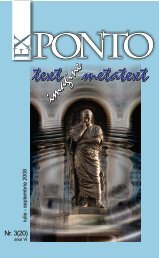Nr. 3 (12) anul IV / iulie-septembrie 2006 - ROMDIDAC
Nr. 3 (12) anul IV / iulie-septembrie 2006 - ROMDIDAC
Nr. 3 (12) anul IV / iulie-septembrie 2006 - ROMDIDAC
- No tags were found...
You also want an ePaper? Increase the reach of your titles
YUMPU automatically turns print PDFs into web optimized ePapers that Google loves.
Ex Ponto nr.3, <strong>2006</strong>contingency of the political choice departing from values in their pure form, inorder to acknowledge a type of political ethics conditioned by the shortcomingsof human nature and the routine of social collectivities. Accordingly, politicscan never be moral, in the sense of being ruled by a categorical imperative;only ethical, given the criteria impending on the very casuistic and contingentlogic of pragmatic decision. Politics cannot be moral for, as Max Weber hasstressed, morality relates to the Ten Commandments.Unlike realism – especially neo-realism, to be more accurate –, thatdivests the world of the ‘international’ of its normative dimension and content,the rationalist via media in academic IR, in which I include Adriano Moreiraand Raymond Aron, is actually a perspective drawing on the recurrent moraltensions inherent to the political dimension of human sociableness. But incase we accept that politics cannot be moral, which relation does politicskeep with morality? Aron’s answer is, I believe, a case of what Maritain callsmoderatum Machiavellianism. It is the case that politics very often departsfrom individual morality to assume the form of dramatic compromises andsynthesis that jeopardize the categorical imperative. The bottom line for Aronis that, “in order to save the nation, we sometimes ought to loose the soul” 20 . InMaritain’s view, all kinds of Machiavellianism must be rejected, either absoluteor moderatum. Notwithstanding, and between an abstract hyper-moralismleading men to cynicism and that kind of Machiavellianism trading with evil,Maritain forwards his own idea of what could be a moral and pragmaticpolitics. Without ignoring the dramatic character of human circumstances,Maritain advances that only the horizon of faith in Providence can contributeto a true politics, able to stand against the temptation of Machiavellianism.Contingency in politics, the casuistic method as the proper way of decisionmakingagainst absolute judgement must in any case be understood in thecontext of a moral horizon of Christian absolute values: “to that kind of politicsoffering the kingdom of this world at the price of the soul, the Christian saysno” 21 . In Maritain’s view, Machiavelli is undeniably guilty of several politicalsins, first of all that of modernity’s fault line separating politics from moralityand the consequent denial of a political tradition going back to Plato, Aristotleand Thomas Aquinas:The systematic exclusion of morality, metaphysics and theology fromthe domain of public knowledge and political prudence is his [Machiavelli’s.]entire responsibility, while being also the most violent mutilation suffered bypractical reason [….] 22 .Mutilation for Maritain draws on the deceitful idea of taking human naturefor what is but men’s episodic iniquity. In this sense, Maritain’s notion of amutilated practical reason could well stand up as the ultimate source of AdrianoMoreira’s critique of instrumental reason and consequent rehabilitation ofpractical reason along the lines of an axiological approach. Consequently, thiskind of approach, assumedly Christian, proceeds through the private dialoguethe author weaves between a moderatum Machiavellianism, and the kindof communitarianism that goes with it, on the one hand, and that humanistcosmopolitanism of an originary community with its natural law, on the other.All in all, this is the insolvable tension between an international ethics obligedto answer to the challenge of accommodation regarding sovereign states’conflicting interests and a more comprehensive universal morality meant topromote justice in overall human relationships.172
















